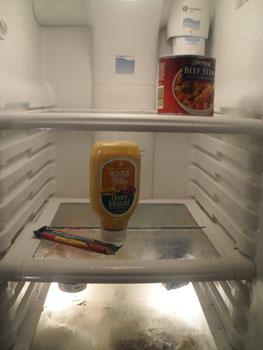Fordham Students Propose An On-Campus Cafeteria Alternative: A Food Pantry
July 12, 2011
Published: February 2, 2011
With financial difficulties at their peak for many college students, food in their bellies is not a daily priority. A recent survey conducted at the University of California-Davis reported that almost 25 percent of undergrads “somewhat to very often” skipped meals to save money and another 25 percent “occasionally” skipped meals for the same reason. After funds are dispersed towards costly tuition, books and living expenses, it’s no surprise that students are skipping meals to save a dime.

Several west coast universities have taken action to halt this nutrition negligence trend within the college community by incorporating food pantries on campus. These pantries are designed to allow all undergraduate students the opportunity to choose from a selection of donated, non-perishable foods that would fulfill a three-meals-per-day diet, according to an article from the Lexington Herald-Leader.
As students of one of the country’s pricier universities in the heart of Manhattan, would Fordham College at Lincoln Center (FCLC) students want a similar type of on-campus food pantry?
The incorporation of a campus food pantry may be in the near future for FCLC. Brandi D’Esposito, FCLC ’11 and president of United Student Government (USG), said she plans on proposing the incorporation of a food pantry at the next USG meeting to see if there is an interest.
Several FCLC students feel that they are more than qualified for an on-campus food pantry. When asked if she skips meals at school due to finances, Sandra Huljev, FCLC ’12, said, “I just bring snacks from home, so I guess you could say I skip meals all the time. An on campus food pantry would be useful because whenever there are free food events on campus, I eat.”
Huljev isn’t the only FCLC student who attends campus events to eat free food as an alternative to pricey cafeteria food.
“The cafeteria food here at Fordham is expensive for the quantity they give you, therefore I make it a point to eat before I get to campus because there really aren’t many affordable options,” Gerald Williams, FCLC ’11, said. “A food pantry would be nice to fall back on instead of grubbing food from occasional campus events.”
Kelly Johnstone, FCLC ’11, said, “I’m a commuter so I usually cook most of my meals at home, but I would say that my friends sometimes go home to eat because they don’t have money to buy lunch at school.”.
According to USG, if incorporated, both commuter and students residing on campus would be able to use the food pantry’s amenities. According to D’Esposito, “Fordham often tries to bridge the gap between commuters and residents, and with commuters being so far from home, the pantry would be just as useful, if not more, for them.
When asked if an on-campus food pantry is deserved amongst the FCLC community, Johnstone said, “[It] sounds great. We pay a lot of money to go to school at Fordham so it doesn’t seem like it’s a huge thing to ask for.”
According to the Lexington Herald-Leader article, all food for the University of California-Davis pantry was donated from establishments such as Campbell’s Soup, Sprouts Market, the Davis Food Co-Op and several campus organizations. At this time, it’s too early to say who would sponsor such a student resource at FCLC, though.
“I’m sure if Fordham is able to fund the food pantry, they would,” D’Esposito said. “Based on previous conversations with Sodexo, and the pricing of their food, my guess is that they wouldn’t have the funds to sponsor a campus food pantry.”
If Fordham officials approve the proposed food pantry, it may not appear on campus until construction of the new FCLC building is complete. “Lack of space is one of the bigger issues student affairs deals with here at Lincoln Center, so if the university did acquire a food pantry the new building being built behind the plaza would be most ideal,” D’Esposito said. “It will have some of our newer amenities and I’m sure there is still some unclaimed space.”








